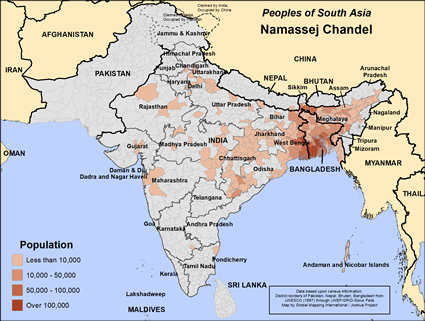When is a Hindu not a Hindu? The Namassej (or Namasudra) Chandel (or Chandal) people of northeast India claim to be Hindus. However Hindus who live in the same region reject them because the Chandal do not accept the four-tier Hindu caste system. The Chandal have their own sacred texts and religious leaders. The Chandal are seen as outside of Hinduism by most Indians. The Namassej have been persecuted by both orthodox Hindus and Muslims. At the time of the 1947 Partition of India, many Chandal left what is now Bangladesh. Unfortunately, they were not welcomed by the Hindu majority nation India. Many were placed in refugee camps. Most Chandal today work as landless agricultural laborers or in jobs no one else is willing to take. Bengali and Assamese are the two main languages of the Namassej. Most of the Chandal are illiterate or functionally illiterate.
As a lower community in India, the lives of the Namassej are very challenging. If the crops fail, they can face starvation. Some Chandal men work as fishmen and as boatmen. Poverty is a way of life for most Namassej. Children quit school after a few years to help their parents in the fields. The few educated Chandal are able to get government jobs and work in businesses. Many Chandal live in villages without access to clean water, modern medicine and electricity. Life expectancy is short and child mortality high. The Namassej marry within their group. Their Hindu and Muslim neighbors often do not want to associate with them. Most Chandal marry in their teens with their families arranging their weddings. Many Chandal live near rivers and lakes so they can fish and earn a living by carrying passengers across the body of water. The diet of the Chandal consists mostly of rice, vegetables and the fish they can catch. As Hindus, they will not eat beef.
The religion of the Namassej is considered to be a sect of Hinduism since the have their own priests and sacred writings. They worship and serve the gods of the Hindu pantheon. Hindus believe that by performing rituals and good works that they will attain moksha or freedom from the endless cycle of birth, death and rebirth. The Chandal visit their Hindu shrines and offer prayers, food, flowers, and incense to their gods in hopes of gaining protection and benefits. They do not have a personal or familial relationship with their gods as Christians do. There are many forms of Hinduism, each with its own deities and beliefs. The main yearly holidays of the Chandal people are Holi, the festival of colors and the start of spring, Diwali, the festival of lights, Navratri, the celebration of autumn and Rama Navami, Rama's birthday. The caste system divides Hindus into four main categories. The lowest communities are outside of the caste system. Orthodox Hindus see the Chandal as low caste. The Namassej community faces discrimination on a regular basis.
As an impoverished community, the Chandal have huge spiritual and physical needs. They need access to clean water, modern medicine and electricity. Their children need good schools. Most of all the Chandal must hear and understand the message about Jesus Christ. He alone can forgive their sins and give them the hope of eternal life.
Ask the Lord of the harvest to send workers into His harvest in the Chandal people of both India and Bangladesh. Pray that the Lord raises up a disciple making movement among the Namassej people this decade. Pray that Chandal parents are able to provide adequately for their children.
Scripture Prayers for the Namassej Chandel in India.
| Profile Source: Keith Carey |











